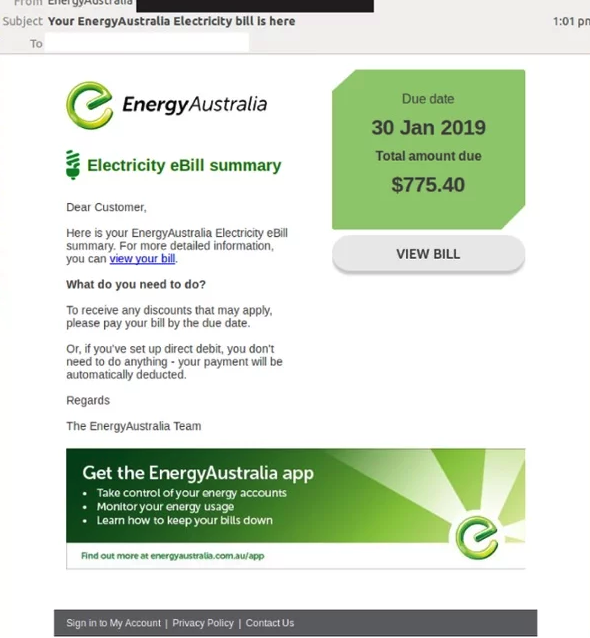
EnergyAustralia has issued a new warning for customers, urging them to beware of a new email scam currently doing the rounds.
The energy company released a statement explaining the hoax email invites customers to view their bill online, but that links contained in the email might be malicious.
People are getting caught out by the scam because the email looks legitimate. The email looks as though it’s from EnergyAustralia and includes a “view bill” link. The company understands unsuspecting recipients who click on the link to view their bill are led to a malicious file download or to a blank page.
“Scam emails such as this one can appear very convincing and customers should take care with any email that requests them to click a link,” the company said.
Meanwhile, the scam has been shared by email security service Mailguard and Scamwatch, run by the Australian Competition and Consumer Commission.

EnergyAustralia said the best way to avoid falling victim is to not respond and delete any suspicious messages you receive immediately. The company said it’s also important to note EnergyAustralia’s electronic bills to residential customers are sent from [email protected].
“If you receive an email from a different address that says it relates to your EnergyAustralia bill, please do not open it or click any links it contains,” the company warned.
If you receive a fake EnergyAustralia email, you can report it to the energy company by forwarding the email to [email protected].
“Once you’ve sent the hoax email delete it from your inbox immediately,” the warning continued. “Then empty your Deleted Items folder.”
Read more: Disturbing new ‘extortion’ email scam doing the rounds
This isn’t the only email scam making the rounds. MailGuard warned late last year that scammers are tricking victims into believing they have obtained sensitive, deeply personal and embarrassing information about them and threatening to publish the content online unless a ransom payment is made in bitcoin.
MailGuard said there are several variations of the email scam, with each attempting to blackmail their target, and advised Aussies to remember the scammers are lying and are trying to pray on people’s insecurities.
The first variation includes extortion emails informing recipients their passwords have been hacked. Attackers place the victim’s password within the email body or in the subject of the email.
A different variation of the email scam tells victims that the attackers have installed special software on their devices to record them when they are viewing adult content.
A third email scam takes a similar approach, informing victims that a “trojan virus” has been installed on their system that has been monitoring the user’s activity for an extended period of time.